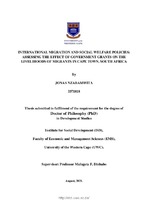| dc.description.abstract | South Africa is paradoxically an interesting case study. On the one hand, it is characterised by widespread and persistent poverty and extra-ordinary levels of unemployment. On the other hand, South Africa is quintessentially a migration destination country, ranking among countries with the highest number of migrants from other African countries. While it currently hosts more than three million international migrants, which represents approximately 4.2% of the country’s entire population, nearly half of the South African black population live in poverty and grapple with income inequality, unemployment, food insecurity and hunger. Much like their South African counterparts, international migrants are not immune to the conundrum of poverty. Added to the poverty-related social challenges that confront the natives of South Africa, foreign nationals in South Africa endure the migration-specific risks, shocks, hardships, deprivation and vulnerabilities. | en_US |

